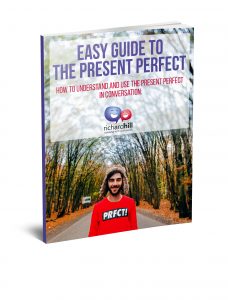 Eight years ago, if you had asked me the question: ‘What is the present perfect tense?’ I wouldn’t have been able to answer you. Now I can tell you it’s a tense in English that tells you that something happened in the past and it is still relevant now. Wow! That was easy 😉 at least, it is after seven years of teaching English!
Eight years ago, if you had asked me the question: ‘What is the present perfect tense?’ I wouldn’t have been able to answer you. Now I can tell you it’s a tense in English that tells you that something happened in the past and it is still relevant now. Wow! That was easy 😉 at least, it is after seven years of teaching English!
Go more in depth with my FREE ebook – Easy Guide to the Present Perfect
Of course, I’m not alone in that as a native English speaker I didn’t know what it was. Recently I interviewed my family and friends for my new video course. I asked them a) What is the present perfect tense? and b) When do we use the present perfect? You might be surprised to find out that my father was the only one who was able to answer yes and explain how to use it. He has studied many languages in his life so he has a good understanding of it.
Is the Present Perfect Difficult for Everyone?
For native speakers of the romance languages, the present perfect isn’t so much of a problem as it also exists in French, Spanish etc. But if you are from a Slavic country like the Czech Republic for example then it can be a bit of a struggle. So just what is the present perfect tense? Read on and I’ll give you a basic overview.
What is the present perfect tense?
To boil it down (as we say to get to the main point) it tells you about something that happened in the past and has some consequence now. Something happened and it’s still relevant at this moment in time. You may have noticed that I have used it already in this article. That is because it’s rather difficult to explain without using it. I am using it because the article isn’t completed yet. I haven’t finished writing it yet. How do you recognize it when you are reading? It’s made like this…
How the Present Perfect is made
Pronoun + have/has + verb Past Participle
“I have seen…”
“He hasn’t played…”
In questions
Have/has + pronoun + verb Past Participle
“Have you heard…”
Look at the dialogue below. The first, short conversation uses only the past simple. You can see that person b needs to ask a second question to fully understand what person a is saying. In the second shorter conversation person b doesn’t need to ask another question because person a used the PrP to explain the situation. Person b understands that person a still has a broken leg right now.
Conversation 1.
a) “I broke my leg”
b) “When?”
a) “I did it three years ago but it’s ok now.”
Conversation 2.
a) “I’ve broken my leg!”
b) “Does it hurt?”
When to use the Present Perfect
Well. simply, there are five situations when you want to use the present perfect simple. I’ll tell you what they are here and if you want to go more in depth, I wrote an ebook about it. You can get it for free by going here: Easy Guide to the Present Perfect
Situation 1.
For life experiences – things that you did in your life. I have driven a double decker bus.
Situation 2.
Unfinished time words – When we say this morning, this week or today. I have drunk three cups of coffee today.
Situation 3.
Things with a present result – This is when something happens and you comment on it immediately before the situation changes. I have dropped my keys.
Situation 4.
New information – Think about the way the news is read in English – ‘There has been an accident.’
Situation 5.
Unfinished actions – When the thing we did is repeated and we know we are going to do it again. I have played football since I was a boy.
When you get the Easy Guide to the Present Perfect you will also get an email mini course to help you better understand the tense. The course includes a free video lesson from the full video course (available soon) and an online quiz to test your knowledge at the end of the course.
So what is the present perfect tense? I hope that now you have a little better understanding and perhaps you would like to learn how to use it properly in your speech and writing. If so, you know what to do.
See you next time,
Richard.



I absolutely loved your explanation. Im currently busy studying Tefl and on an assignment ehere i chose to use the present perfect ….difficult though….thank you for your help.
My pleasure Gabby, glad you found it helpful and many thanks indeed for your kind words 🙂
Very nicely explained, thanks!
Thanks for letting me know Yasmin, glad you liked it 🙂